by Richard Wike, senior researcher, Pew Global Attitudes Project
Taken aback by critical depictions of their country’s “collective funk,” Italians are currently engaged in considerable hand-wringing over the condition of their national psyche. It started a few weeks ago with a broadside from across the Atlantic by Ian Fisher in the New York Times. “Italy,” Fisher wrote, “seems not to love itself.” Analyzing the country’s malaise, he detailed a litany of woes: an anemic economy, a low birth rate, corrupt politicians, mobsters. Only days later, the London Times piled on, lamenting Italy’s “national angst” as it “faces up to being old and poor.” Worse still, the country’s international image has suffered with press reports of Naples’ garbage crisis — with landfills overflowing in late December, collectors stopped picking up trash, which now piles up in unpleasant mounds across the city.
Certainly rotting trash is not the image most Americans associate with Italy, the land of dramatic history, great food, and expensive style (think Gucci, Armani, Ferrari). And many Americans return from Italy with a strong appreciation for the Italian approach to living — the slower pace, the long meals, the passeggiata, or “evening stroll.” But in truth, the malaise camp might be on to something. Italians are a bit glum, and it shows in public opinion polls. In spring 2007, the Pew Global Attitudes Project surveyed 47 countries, and on a variety of issues — life satisfaction, national conditions, immigration — Italians had a distinctively negative outlook.1
Italians Less Satisfied With Life
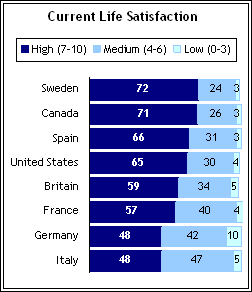
Despite its reputation for la dolce vita, when it comes to rating their current lives and looking to the future, Italians are generally gloomier than their fellow Europeans, as well as Americans and Canadians. For example, when asked to place themselves on a “ladder of life,” where zero represents the worst possible life and 10 the best possible life, fewer than half of Italians (48%) rate their life at least a seven. On the other hand, in Sweden (72%), Canada (71%), Spain (66%), and the United States (65%), more than six-in-ten respondents place themselves on the top rungs of the ladder.
As is true throughout much of Europe, dissatisfaction is particularly common among older citizens — only 37% of Italians ages 55 and older give their current life a high rating, compared with 49% of those ages 35-54. On a positive note, young Italians (ages 18-34) are much happier — 60% rate their life at least a seven on the zero-to-10 scale. Figure
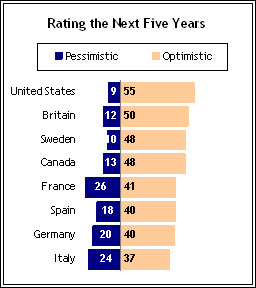
People who live in Northern Italy also tend to be more satisfied — 55% are in the high category, compared with only 42% of those from the less economically developed Southern and Central provinces. Compared with other western publics, however, even Northern Italians are relatively dissatisfied.
Little Optimism
Italians are also the least optimistic among the eight Western countries surveyed. Only 37% of Italians think they will be at a higher spot on the ladder of life in five years. In contrast, in the United States — a country famous for its optimism — 55% say they will be better off.
Italians are even less optimistic if the timeframe is extended further into the future — only 10% believe children in their country will have a better life than people do now, the lowest percentage among Western countries. Of course, pessimism about the long-term future is pretty common throughout the West. With just 36% saying their nation’s children will have a better life, the Spanish emerge as the most optimistic on this score.
Widespread Dissatisfaction With National Conditions
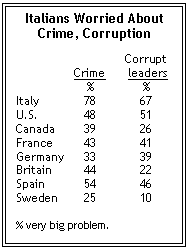
Italians also stand apart from others in the West when it comes to rating their national conditions. In the Pew survey, only 16% of Italians were satisfied with the way things were going in their country, the lowest percentage in any Western country. Certainly, much of this dissatisfaction is tied to the country’s lackluster economic growth. As Richard Owen notes in the London Times piece, in 2007 Italian living standards fell below those in Spain, dealing yet another blow to the country’s ego. Seven-in-ten Italians characterize the country’s economy as somewhat or very bad.
Crime and political corruption are also considered much bigger problems in Italy than in other Western nations. Nearly eight-in-ten (78%) Italians say crime is a “very big problem” for their country, while two-thirds rate corrupt political leaders a very big problem.
Strong Concerns About Immigration
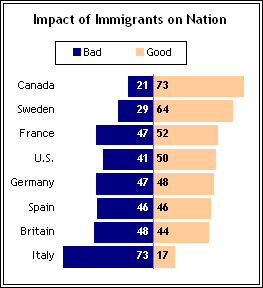
Immigration, however, may be the issue on which Italy is most distinctive. Like much of Western Europe, over the last few years Italy has wrestled with how to successfully integrate and assimilate its Muslim minority. Additionally, the recent influx of Romanian immigrants — especially Roma, or gypsies from Romania — into Italy has led to new controversies over immigration. The 2007 Pew poll included a number of questions on immigration, and on each of these, Italians held the most negative opinions of any Western public.Nearly two-thirds of Italians (64%) believe immigration is a very big problem for their country. In no other Western nation did a majority rate immigration a very big problem (Spain was the closest at 42%). In fact, Italy’s level of concern was the highest, not only among Western countries, but among all 47 nations included in the survey.
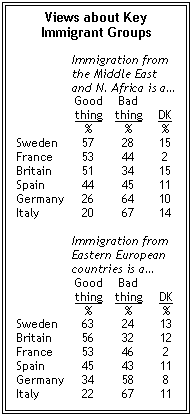
Similarly, roughly three-in-four Italians (73%) say immigrants are having a bad effect on their country, considerably more than any other Western public, and second only to South Africa (75%) among the 47 nations in the study.
Fully 87% of Italians say there should be tighter restrictions on people coming into their country — up seven points from 2002, and again, the highest percentage among Western countries. Italian attitudes are overwhelmingly negative toward immigrants from the Middle East and North Africa, as well as immigrants from Eastern Europe. Two-thirds say immigration from each of these areas is a bad thing.
National Pride
Despite all these signs of a rather dark mood, many Italians still reject the malaise argument, including Giuliano Amato, the country’s interior minister. A week after Fisher’s article appeared, Amato struck back in a letter to The New York Times, trumpeting his country’s economy and health care system, and its recent successes in fighting the mafia.
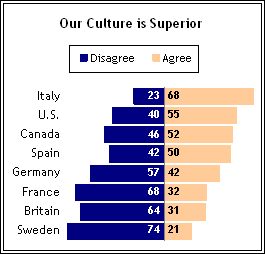
Certainly, Amato is not alone in taking pride in his country, especially its culture. Italians are much more likely than their fellow Westerners to believe in their country’s cultural pre-eminence. About two-in-three Italians (68%) agree with the statement “Our people are not perfect, but our culture is superior to others.”
By contrast, in neighboring France — a country well known for having pride in its language and culture — only 32% say their culture is better than others. Italians are even more confident in their cultural superiority than Americans (55%), who themselves are well known for their strong national pride.




